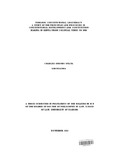| dc.description.abstract | This study has involved an extensive assessment of constitutional developments and the challenges of constitutional governance and change in Kenya from the colonial times to 2010. In particular, the study has examined the extent to which both colonial and post-colonial constitutional developments and constitution making processes contributed to building of constitutional legitimacy in Kenya. The study finds that throughout its constitutional history, Kenya has experienced one constitutional crisis after another. While the basic character of the colonial constitutional order was incurably exclusive, imperial, oppressive and unaccountable, the political elite in post independence Kenya continued the colonial legacy of manipulating the law to secure themselves special economic and political advantages. The study therefore finds that both colonial and much of postcolonial constitutional developments grossly fell short of the key ingredients of democratic constitutionalism. To this end, neither colonial nor postcolonial constitutional developments contributed to building of constitutional legitimacy until the promulgation of the Constitution of Kenya 2010.
The study further finds that although the novelty of the Constitution of Kenya review from 1997 to 2010 centred on extensive public participation in the review process, the mere act of public participation in Constitution making is not in itself sufficient to secure the legitimacy of the process and its outcome. To be effective, a participatory constitution making enterprise must be based on solid constitutional and legal foundation. The political elite must also demonstrate sustained commitment and willingness to support meaningful
vi
public participation in the process. More importantly, enabling mechanisms must be established to ensure that people‘s participation is meaningful and that processes of ratifying the proposed Constitution are credible and representative of the people‘s will. Finally, the study finds that fundamental constitutional change does not take place during peacetime. Typically, as demonstrated both during the colonial and post independence periods, all the major and fundamental constitutional changes in Kenya were, preceded by periods of intense civil unrest and violence. The study thus argues that the ruling elite will not support fundamental constitutional reforms unless the status quo is, threatened by civil unrest.
The study therefore contends that in order to secure functional and political legitimacy, both Constitution making and management of the constitutionality must seek to guarantee meaningful people‘s participation. The study concludes hence that what matters is not the mere presence of a written Constitution, but rather how the Constitution is, made to work for the wellbeing of the people. This, is what will ultimately, determine the respect and honour that the Constitution commands as the pre-eminent norm of the society. Without this, there is likely to be a contestation of the legitimacy of the Constitution, which will most often lead to a break down in law and order and ultimately, the collapse of the state. It is against this background that the study recommends a design of Constitution making and management that not only nurtures popular constitutionalism but also ensures that constitutional development is functionally, tied to the vision of democratic governance and social justice | en |

